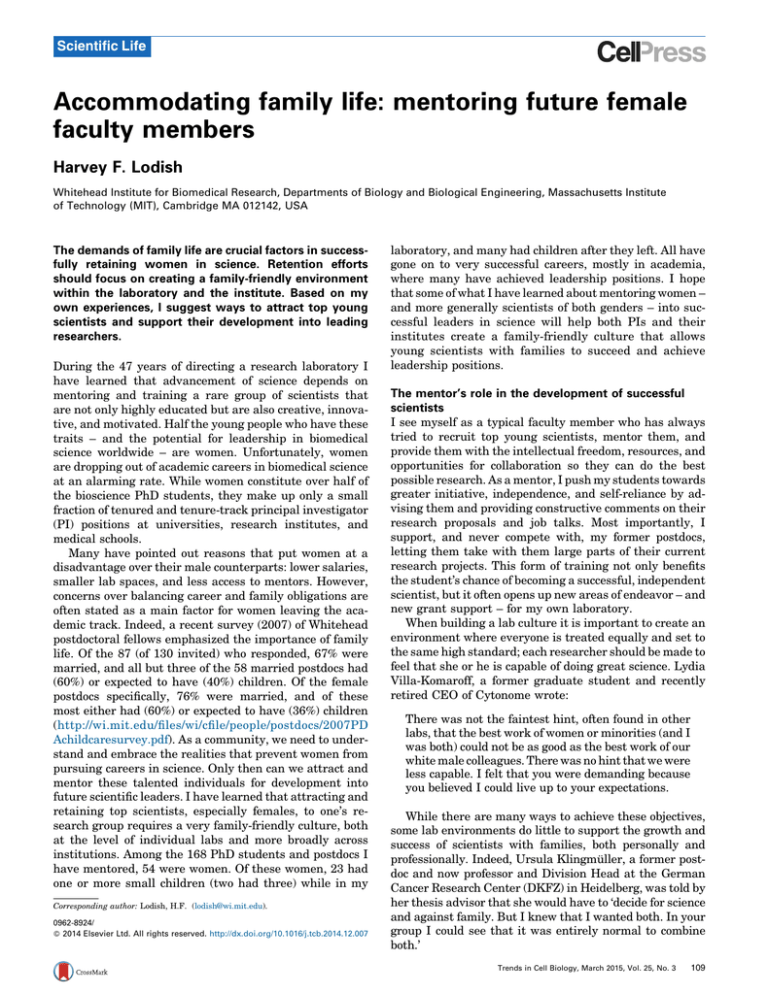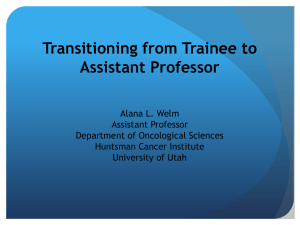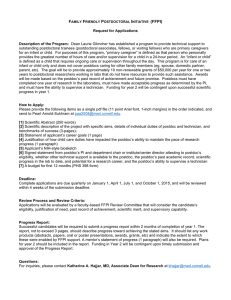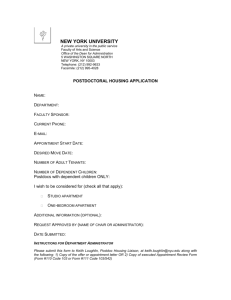
Scientific Life
Accommodating family life: mentoring future female
faculty members
Harvey F. Lodish
Whitehead Institute for Biomedical Research, Departments of Biology and Biological Engineering, Massachusetts Institute
of Technology (MIT), Cambridge MA 012142, USA
The demands of family life are crucial factors in successfully retaining women in science. Retention efforts
should focus on creating a family-friendly environment
within the laboratory and the institute. Based on my
own experiences, I suggest ways to attract top young
scientists and support their development into leading
researchers.
During the 47 years of directing a research laboratory I
have learned that advancement of science depends on
mentoring and training a rare group of scientists that
are not only highly educated but are also creative, innovative, and motivated. Half the young people who have these
traits – and the potential for leadership in biomedical
science worldwide – are women. Unfortunately, women
are dropping out of academic careers in biomedical science
at an alarming rate. While women constitute over half of
the bioscience PhD students, they make up only a small
fraction of tenured and tenure-track principal investigator
(PI) positions at universities, research institutes, and
medical schools.
Many have pointed out reasons that put women at a
disadvantage over their male counterparts: lower salaries,
smaller lab spaces, and less access to mentors. However,
concerns over balancing career and family obligations are
often stated as a main factor for women leaving the academic track. Indeed, a recent survey (2007) of Whitehead
postdoctoral fellows emphasized the importance of family
life. Of the 87 (of 130 invited) who responded, 67% were
married, and all but three of the 58 married postdocs had
(60%) or expected to have (40%) children. Of the female
postdocs specifically, 76% were married, and of these
most either had (60%) or expected to have (36%) children
(http://wi.mit.edu/files/wi/cfile/people/postdocs/2007PD
Achildcaresurvey.pdf). As a community, we need to understand and embrace the realities that prevent women from
pursuing careers in science. Only then can we attract and
mentor these talented individuals for development into
future scientific leaders. I have learned that attracting and
retaining top scientists, especially females, to one’s research group requires a very family-friendly culture, both
at the level of individual labs and more broadly across
institutions. Among the 168 PhD students and postdocs I
have mentored, 54 were women. Of these women, 23 had
one or more small children (two had three) while in my
Corresponding author: Lodish, H.F. (lodish@wi.mit.edu).
0962-8924/
ß 2014 Elsevier Ltd. All rights reserved. http://dx.doi.org/10.1016/j.tcb.2014.12.007
laboratory, and many had children after they left. All have
gone on to very successful careers, mostly in academia,
where many have achieved leadership positions. I hope
that some of what I have learned about mentoring women –
and more generally scientists of both genders – into successful leaders in science will help both PIs and their
institutes create a family-friendly culture that allows
young scientists with families to succeed and achieve
leadership positions.
The mentor’s role in the development of successful
scientists
I see myself as a typical faculty member who has always
tried to recruit top young scientists, mentor them, and
provide them with the intellectual freedom, resources, and
opportunities for collaboration so they can do the best
possible research. As a mentor, I push my students towards
greater initiative, independence, and self-reliance by advising them and providing constructive comments on their
research proposals and job talks. Most importantly, I
support, and never compete with, my former postdocs,
letting them take with them large parts of their current
research projects. This form of training not only benefits
the student’s chance of becoming a successful, independent
scientist, but it often opens up new areas of endeavor – and
new grant support – for my own laboratory.
When building a lab culture it is important to create an
environment where everyone is treated equally and set to
the same high standard; each researcher should be made to
feel that she or he is capable of doing great science. Lydia
Villa-Komaroff, a former graduate student and recently
retired CEO of Cytonome wrote:
There was not the faintest hint, often found in other
labs, that the best work of women or minorities (and I
was both) could not be as good as the best work of our
white male colleagues. There was no hint that we were
less capable. I felt that you were demanding because
you believed I could live up to your expectations.
While there are many ways to achieve these objectives,
some lab environments do little to support the growth and
success of scientists with families, both personally and
professionally. Indeed, Ursula Klingmüller, a former postdoc and now professor and Division Head at the German
Cancer Research Center (DKFZ) in Heidelberg, was told by
her thesis advisor that she would have to ‘decide for science
and against family. But I knew that I wanted both. In your
group I could see that it was entirely normal to combine
both.’
Trends in Cell Biology, March 2015, Vol. 25, No. 3
109
Scientific Life
Furthermore, it is clear that the success of women goes
beyond creating an equal opportunity environment and is
also dependent on providing guidance and support to help
them achieve their goals. I learned many years ago from
my wife Pamela and my two professional daughters that I
could recruit spectacular young female (and male) scientists if I accommodate family life and the personal needs of
everyone. Indeed, Ursula Klingmüller commented that
this respect increased a scientist’s confidence in achieving
success. It also ‘meant high expectations and responsibilities, but also a choice and this was extremely important
for me.’
While some may hesitate in recruiting researchers with
families because of the idea that they may devote less time
to the lab, I have found that men and women who have
children as graduate students or postdocs have excellent
time-management skills. When in the laboratory they
work and think very efficiently, and do not waste time,
ultimately impacting upon the progress of our work in a
positive way. As Beiyan Zhou, a former postdoc and now
professor at Texas A&M University, points out: ‘If these
issues [integrating family and scientific roles] are dealt
with directly, they can become an invaluable exercise in
improving management skills and multitasking.’
How then does one create a family-friendly environment
that also produces quality research? First, it is important to
create an environment where families are welcome. When
interviewing potential students or postdocs, I never ask
anything about family matters or children – such questions
are illegal in any case. I do volunteer the information that
Whitehead operates its own child-care facility and has a
lactation room. Often I show them pictures of my own seven
grandchildren or of our annual lab swimming party where
20 or so small children, with parents, fill the pool. These
comments make the point that I welcome researchers with
children. I also make sure that interviewees meet both male
and female postdocs, many of whom have small children. I
have found this approach extremely useful in recruiting
outstanding researchers of both genders. Furthermore, this
family-focused environment also provides students and
postdocs with the added opportunity to exchange experiences, challenges, and opportunities with each other, which
can ultimately enhance self-confidence and a commitment
to one’s career. Indeed, Merav Socolovsky, a former postdoc
and now professor at the University of Massachusetts Medical School, recently wrote to me:
Trends in Cell Biology March 2015, Vol. 25, No. 3
professor at MD Anderson Cancer Center points out: ‘A
good mentor also needs to understand the flexibility needed to raise children, and/or care for aging parents.’ An
important way of creating a family-friendly environment
is to treat all lab members as adults, free to plan their
own schedules. Aside from attending our weekly lab
meeting, and being available to talk with me for an hour
or so each week, I have never kept track of anyone’s face
time in the laboratory. Their scientific progress is all I
really care about. Rebecca Wells, now a professor at the
University of Pennsylvania School of Medicine, put it
succinctly:
This [mentoring] gave parents like me the extraordinary gift of flexibility, which in turn made it possible
to function in science and be happy parents simultaneously. Whether you realized it or not, there was an
exodus every night at dinnertime as parents went
home, ate with their children, and put them to bed,
but then those same people came back at about nine
and worked late into the night. I never felt that I had
to sacrifice time with my family so that my face would
be visible in the lab – I knew that you had confidence
in my ability to be there when and for as long as I
needed to be.
Being sympathetic to families and children is, I
have found, one way to attract the best students and
postdocs.
I interviewed in your lab in 1992, nearly two years
before I actually started my postdoc. It was the 7th
lab I visited in the USA. I was struck by the very large
number of parents, mostly women, who were articulate, enthusiastic scientists doing great projects. I
didn’t yet have children and was anxious about how
to do it all, but realized that people in your lab
somehow worked it out. There was no question in
my mind by the end of that one-day visit that that’s
where I wanted to do my postdoc.
The Institute’s role in supporting postdoctoral fellows
PI’s cannot do this alone. Institutions have a responsibility
to insure that graduate and postdoctoral training is compatible with a reasonable family life. Childcare was and is
the main issue for postdocs, both male and female. The
substantial cost of child care (on average, 25% of a postdoc’s salary) places a financial burden on most postdoc
families.
In 2007, MIT had one child-care facility, but the waiting
list included several hundred children. Seeing the results
that many postdocs do or want to have families, one
Whitehead Board member donated funds such that Whitehead now owns its own childcare facility. Whitehead offers
discounts to students and postdocs to help to alleviate the
burden of rising costs of childcare. Furthermore, during a
lunch several years ago with the Biology Department
Visiting Committee, several faculty members complained
about the paucity of affordable and nearby childcare. On
the spot, an MIT Corporation member promised to support
a new facility; it opened last year.
Institutional support of childcare is not only the right
thing to do; it is important in attracting and retaining the
best students, faculty, and staff in an increasingly competitive environment. Equally importantly, onsite or nearby
childcare gives postdocs and students as well as faculty the
piece of mind so that they can work at their optimum levels
in the laboratory.
Furthermore, it is important to understand and empathize with the demands that family can place on researchers. Stephanie Watowich, a former postdoc and now
Looking ahead
As PIs and institutes begin to create an environment that
is permissive to families, more women will likely continue
to pursue a career in science and ultimately correct the
110
Scientific Life
leaky academic pipeline. Moreover, the actions I noted may
inspire future generations to create a similar lab culture,
which could ultimately increase the number of successful
leaders that remain in science. Indeed, it is more than
training leading academic scientists; Stephanie Watowich
also wrote to me:
To have an informed, educated population, women
themselves need to be educated and accomplished....
More women in science will mean more women able
to translate the importance of scientific breakthroughs to children, neighbors, friends and colleagues, to help sustain vibrant and healthy
communities.
Trends in Cell Biology March 2015, Vol. 25, No. 3
My final comments are directed to students of both
genders who are looking for a postdoc position and aspire
to a tenure-track faculty position. Ask the question of your
potential mentors that I am almost never asked: ‘What
happened to your last five (or ten) postdoctoral fellows;
where are they now?’ And make sure your mentor not only
will provide you with excellent career opportunities, but
also respects and appreciates your personal and family life.
Acknowledgments
I thank my former mentees Stephanie Watowich, Lydia Villa-Komaroff,
Ursula Klingmüller, Beiyan Zhou, Merav Socolovsky, Rebecca Wells,
Lilian Wikström, and Jean Schaffer, as well as my editor Danielle
Loughlin, for their thoughtful comments and critiques of this article.
111



